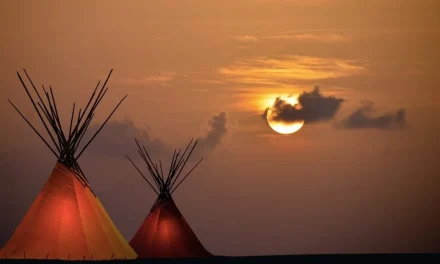Elizabeth Warren says she would expand the Buy Indian Act to all government agencies, and raise its set-asides, to steer more federal dollars to Native businesses. (Photo by Gage Skidmore, Flickr/CC)
The field of hopefuls vying for the 2020 Democratic nomination for President, who will face off against Republican incumbent Donald Trump, has been whittled to six. They want your vote — but what do they plan to do for Native business and entrepreneurship? We took a look at each one’s stated policies (when they exist) and actions.
(The below roundup reflects the candidate’s campaign platforms as they pertain to business and is not indicative of Native Business opinion or preference.)
BEST IN CLASS: Warren, Buttigieg
Elizabeth Warren
Official Policy Positions: The “I have a plan for that” candidate has plans upon plans for Indian Country, detailed on her website. She frames many Native economic challenges as the legacy of corruption — people (Native and otherwise) will thrive under a government that prioritizes their well being over that of giant corporations. Like other candidates, Warren cites infrastructure as a key area, but goes into far more detail. Everyone wants Native households and businesses to have broadband access, but Warren also says that roads and electricity need to be improved as well if economic development is to occur. In addition to physical infrastructure, Warren says that she would build a financial infrastructure, too, as entrepreneurs trying to get their start on Tribal lands are extremely disadvantaged by the lack of banks and access to capital. Warren proposes full legalization of marijuana, a potential cash crop for some Tribes. She also would expand the Buy Indian Act to all government agencies, and raise its set-asides, to steer more federal dollars to Native businesses.
Public Actions and Statements: Though Warren has plenty to say about her Indian Country plans, she is best known for the saga of her questionable Native identity, and President Donald Trump’s racially-insensitive attacks on her as “Pocahontas.” Nonetheless, she does speak frequently about American Indian concerns, advancing the positions outlined on her site. But perhaps the most important statement she has made to Native voters came at the Frank LaMere Native American Presidential Forum in Sioux City, Iowa. “I know that I have made mistakes,” she said. “I am sorry for the harm I have caused.”

Pete Buttigieg
Official Policy Positions: On his website, Buttigieg has an extensive page outlining his Tribal policies in detail. The Economic Development section lays out a general approach and lists nine bullet points. Some of his principles, such as a more productive nation-to-nation relationship, would indirectly benefit Tribal business. Other specific proposals, such as implementing a National Service Plan that supports Indian Country and updating the Indian Tribal Energy Development and Self-Determination Act, could directly empower Native business opportunity and clout.
Public Actions and Statements: Pete Buttigieg was instrumental in a 2016 Native business success story — as mayor of South Bend, Indiana, Buttigieg was a partner in the successful campaign to restore land to the Pokagon Band of Potawatomi Indians. The 165-acre parcel was set aside for housing and the successful Four Winds Casino. More recently, in a Tweet, Buttigieg praised Native American leadership in the fight against climate change, and said that the federal government should follow Natives’ lead — such recognition of Native ingenuity and stewardship of the land would undoubtedly bring opportunity.
ABLE AND EXPERIENCED: Sanders, Klobuchar

Bernie Sanders
Official Policy Positions: While Sanders’ Empowering Tribal Nations page is a bit brief, two of his five bullet-point proposals show a concern for economic development. First, he proposes to target neglected Native communities using the 10-20-30 formula, which steers federal funds for education and economic opportunity to the areas that have suffered long-term disadvantages. Additionally, projects associated with his Green New Deal would guarantee jobs and would, he says, contribute to rebuilding local Native economies. Young Native voters have embraced Sanders for his vows to eliminate student debt and make public universities free to attend. Financial concerns have kept many Natives from pursuing higher education that can be key to business and entrepreneurship.
Public Actions and Statements: Like Buttigieg, Sanders has suggested that Native Americans can lead the way on issues relating to the environment and climate change, an effort that will require business acumen as well as traditional knowledge.

Amy Klobuchar
Official Policy Positions: The page dedicated to Tribal Policies on Klobuchar’s website makes a compelling case that she has worked with Tribes and will continue to do so. In a long list of policiess, she proposes fostering economic development through renewable energy, and promises broadband access for every household in Indian country by 2022.
Public Actions and Statements: As a Minnesota Senator, Klobuchar has a constituency that includes numerous Tribes and Nations, and her fluency in Native issues is evident. She has a record of supporting pro-Native legislation and promoting Native culture in Washington.
SHORT ON INFO: Biden, Bloomberg

Joe Biden
Official Policy Position: Joe Biden does not have a stated policy for Native American concerns in general or Native business concerns in particular. On his website, he mentions bringing broadband to all Americans, calling out “rural and Tribal areas” specifically.
Public Actions and Statements: Biden has generally not offered policy ideas or positions relating to Natives in public statements. When addressing the Native American Presidential Forum in January, he said that he would strengthen Tribal Nations, as, he said, Obama did. So if you liked Obama’s policies, you might like Biden’s. If you don’t think Obama did right by Natives and Native businesspeople, well…

Mike Bloomberg
Official Policy Position: Michael Bloomberg does not outline any sort of plan for Native economic opportunity or business. The policies outlined on his website mention Natives with respect to climate, wildfires, voter rights and housing affordability. Speaking more generally, Bloomberg presents himself as an advocate for entrepreneurship, with a history as a wildly successful entrepreneur, and says he will “Improve and expand opportunities for businesses owned by women, minorities, and veterans.”
Public Actions and Statements: In 2010, when Michael Bloomberg was Mayor of New York City, Governor David Paterson was in a dispute with the Seneca Nation over cigarette taxes. On a radio show, Bloomberg expressed his feelings. “I said, you know, get yourself a cowboy hat and a shotgun,” Bloomberg said. “If there’s ever a great video it’s you standing in the middle of the New York State Thruway saying, you know, ‘Read my lips — The law of the land is this and we’re going to enforce the law.'” The Seneca Nation took the statement and the use of “cowboy” as a slight, and asked for an apology or Bloomberg’s resignation, neither of which happened. Is this a one-off anecdote or evidence of anti-Tribal bias?








